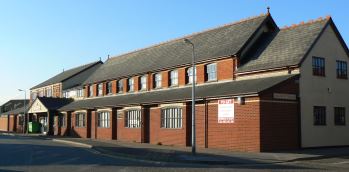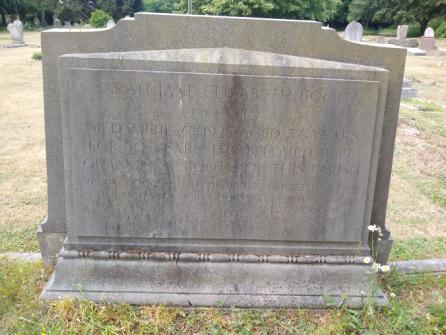James Wilson Booth

James was born in Cork,
Ireland in 1849 the son of John Peter Booth and Harriet. His father
was involved in the large manufacturers Booth and Fox at Lavitts
Quay, Cork who were the inventors and patent holders of the Down
Quilt.
James and his siblings Frank
and Caroline moved from Cork to live with their Step Mother Hannah
Booth at Bristol where James became an apprentice engineer and in
1874 he married Sarah Cridland.
The newly married couple
moved to St Pancras where he obtained work for Ramsomes in London
and developed the pattern for an iron piano frame. In 1889 he
patented the design of string fastenings for pianos although the
following year his business as declared bankrupts.. This led
to him starting a piano business as an agent for Colebrook Dale Iron
Foundry.
James and Sarah
were to have seven Children – Sons Christopher, and Paul and
Daughters Christabel, Hannah, Kathleen, Jeanine, and Sarah.
James was fond of sailing and
purchased a yacht called Sarandon which he based at Burnham on
Crouch and led to his becoming an early member of the Royal Burnham
Yacht Club. During his life more yachts were purchased and sold
including Firefly, Moreen, Cateran, Idris and Danea.
James became an excellent
yachtsman making the trip to Ireland at least three times on the
Cateran yacht.
The Booth family moved to
Western Road, Burnham on Crouch in 1900 before moving to the Limes,
Crouch Road in about 1913..
The regular trips to Burnham
made James consider a venture based in the town as he considered
that the area would prove a health place for employed to live and
work in a foundry. He agreed a partnership with R T palmer and they
purchased land off station road ( now known as Foundry lane) and
started the Foundry Ironworks as Booth and Palmer. James
brought his knowledge to the fore and the speciality of the business
was to cast metal Piano Frames.
Booth and Palmer grew quickly
and a few years later became a company with a change of name to
Booth and Brooks with 250 employees making more piano frames than
any other foundry in the world. As technology grew then so did they
by casting thousands of turntables for the newly popular
gramophones.
Burnham Foundry grew in
strength under the leadership of James with sons Christopher and
Paul both playing a large part in its development.
 The remaining
sections of Mildmay Ironworks after redevelopment
The remaining
sections of Mildmay Ironworks after redevelopment
James never forgot his
heritage and was a strong advocate of Home Rule for Ireland and so
from the1880’s onwards he was involved in the political campaign to
gain independence. He became a familiar figure in parliamentry
circles, especially with the Irish MP’s and often held meetings with
well known political figures in his Burnham home.
A regular visitor and good
friend was Mr T P O’Connor who was a fellow Nationalist, a newspaper
editor and a MP of such long standing that he became Father of the
House.
Within British politics,
James was a member of the Liberals and was president of the Burnham
Liberal Association and a prominent member of the Liberal Club in
London.
As a dog lover he was
president of the Irish Woolfhound Association.
James was appointed as a JP
and performed regularly on the Southminster bench. He had a
particular interest in mental health and visited a number of mental
hospitals and also was a regular visitor to Chelmsford Prison to
check on prisoner welfare.
His wife, Sarah, died in 1925
after which in March 1926 he remarried to Bertha Christina Fox, who
like James had been born in Cork and was connected to Booth and
Fox, and moved to Bournemouth before returning to Essex and living
at Tower House, Springfield.
James died of 10 April 1931
at Tower House after a sudden illness having been at Burnham just a
few days earler.

The funeral service, conducted by Rev J M Carrack of Steeple, took place on 15 April 1931 at St Mary’s Church, Burnham on Crouch.
The coffin was draped with
the flags of the Royal Burnham Sailing Club, The National Liberal
Club and the Irish Ensign and was borne by Mr G Whiting, Mr S
Pudney, Mr P Dowsett, Mr P Parsons, Mr C Harvey, Mr R Halliday, Mr W
Beard and Mr C Spooner all of which were employees of the Mildmay
Ironworks.
The service was followed by a
burial in the cemetery alongside his deceased wife, Sarah.
The mourners included –
Sons and Daughters Mr & Mrs
C C Booth, Mr P M Booth, Mr & Mrs Parsons, Mr & Mrs Alleyne and Miss
K M Booth. Grandchilren – Masters Paddy & John Booth, Misses Monica
& Sheila Booth.
Representative Roles - Mr
Herbert Fox (Cousin and Managing Director of Booth & Fox), Mr S G
Turner, W J Robins and S Martin Heard ( Directors of Booth and
Brooks), Mr Richard Chisnall ( Clyde Steel Works, Sheffield and
National Liberal Club), Mr Henry Kipling (James Dowling), Mr Charles
R Gowers ( Maldon Ironworks), Mr F Smith ( Booth and Fox), Mr Walter
E Davies and Mr J A Sinclair ( National Liberal Club),Mr Herbert
Sadd JP ( Maldon Divisional Liberal Club), Mr G N Ritchie ( Burnham
Liberal Association), Mr G Sangster ( Burnham Young Liberals), G
Raby ( CA), W T Potts CBE CC , E Pipe and C J Cranfield ( Justices
of the Southminster Bench), Mr F H Bright ( Clerk to the Justices),
Mr Lacey ( District Manager of LNER)
Individual Mourners – Dr &
Mrs J F McDonald, Inspector Hubbard, Dr R W Quennell, Dr R Lloyd,
Rev E L Lewis, Major Guthrie, Captain F W Watson MBE, Mr & Mrs P W
Petticrow, Mr E Dilliway, Mr C E Marsh, Mr H Parnell, Mr A W
Parnell, Mr A B Croxson, Mr J Parker, Mr & Mrs J W Jones, Mr A W
Bell, Mr R Elliot, Mr & Mrs Wilson, Mr E Harris, Mr W J Hopgood, Mr
W J Newman, Mr E W Sadler, Mr H Becher, Mr N S Carr, Mr J F Watson,
Mr S Dale, Mr & Mrs G F Bacon, Mr S Bacon, Mr J Bacon, Mr G
Tunbridge, Mr T Taylor, Mr A Bowman ( for many years foreman at
Mildmay Ironworks), Mr W C Clarke, Mr H Billinghurst, Mr W Carter,
Mr A Carter, Mr H Nethercoat, Mr & Mrs H F Bawtree, Mr J H Jackson,
Mr H A Savage, Mr & Mrs H P Hood, Mr M King, Mr J Whiting, Mr R J S
Tucker, Mr J Cook, Mr P P Sabel, Mr C Bridge, Mr E T Brooks, Mr F G
Hawkins, Mr & Mrs G Brown, Mr E Duplantier and about fifty of the
workers of the Mildmay Ironworks.



